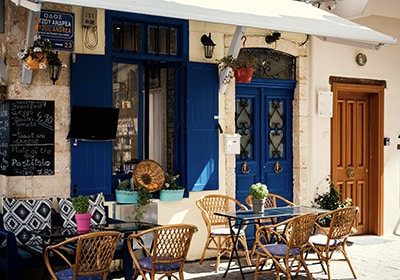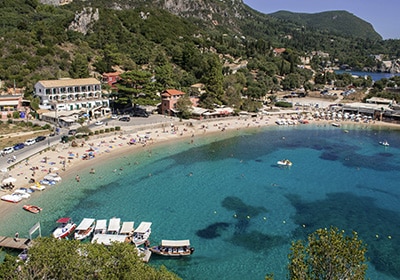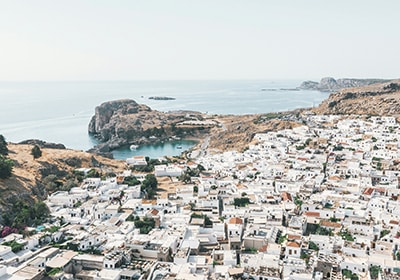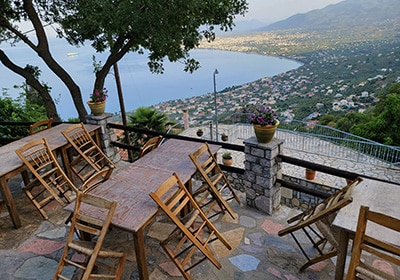Greece consistently ranks among the top destinations for those seeking a high quality of life, combining affordability, natural beauty, and a welcoming culture. Whether you’re an expat planning a long-term move, a family looking for safety and strong education options, or a young professional drawn to digital nomad hubs, the best places to live in Greece offer something for everyone. From the historic streets of Athens and the vibrant lifestyle of Thessaloniki to the laid-back island life in Crete and Corfu, this guide breaks down the top cities and regions to help you find the right fit for your goals and lifestyle.
This guide will discuss:
Top 6 Locations to Live in Greece
1. Athens

Why live in Athens?
- Central hub for business, government, and international organizations
- Extensive public transport, including metro, buses, and trams
- Fast internet and numerous co-working spaces ideal for digital nomads
- Wide availability of English-speaking services and communities
Best areas
- Glyfada: A coastal suburb with international schools, parks, and beachfront cafes.
- Kifisia: Known for its leafy streets, luxury homes, and private schools.
- Chalandri: A residential area with strong infrastructure, local markets, and proximity to top schools.
Cost of living in Athens
- Rent (1-bedroom city center): €500–700
- Utilities: €120–160/month
- Public transport pass: €30/month
- Dining and groceries: Moderate compared to Western European capitals
Education and International Schools in Greece
- St. Catherine’s British School: British curriculum, Kifisia
- ACS Athens: American and IB programs, Chalandri
- Campion School: British curriculum, Pallini area
Lifestyle & activities
Athens offers year-round cultural experiences, including museums, concerts, festivals, and outdoor cinemas. Its historical sites are globally renowned, and the city has easy access to beaches and mountain hikes.
2. Thessaloniki

Why live in Thessaloniki?
- Lower cost of living compared to Athens
- Strong presence of English-speaking expats and students
- Compact and walkable city with vibrant public spaces
- Excellent food scene and cultural events throughout the year
Best areas
- Kalamaria: Family-friendly with waterfront access
- Panorama: Quiet, safe, scenic
Cost of living in Thessaloniki
- Rent (1-bedroom city center): €400–600
- Utilities: €110–150/month
- Public transport pass: €25/month
- Dining and groceries: Affordable and widely available
Education & healthcare
- International and bilingual schools are available in the city and surrounding suburbs.
- Public and private healthcare facilities offer reliable medical services.
- Family-friendly neighborhoods like Kalamaria and Panorama provide safe environments, access to schools and parks, and proximity to the waterfront.
Lifestyle & community
Thessaloniki is known for its lively yet laid-back atmosphere. From the White Tower promenade to Ano Poli’s historic streets, the city offers a mix of modern and traditional.
3. Crete

Why live in Crete?
- Lower cost of living than mainland cities
- Established expat communities and English-speaking services
- Diverse environments: coastal towns, rural villages, and urban centers
- Family-oriented lifestyle with a strong sense of local community
Best Areas
- Heraklion: Capital of the island with modern amenities, international schools, and a growing job market.
- Chania: Popular among expats for its Venetian architecture, relaxed atmosphere, and walkable city center.
- Rethymno: Smaller and quieter, ideal for families and retirees looking for a more traditional lifestyle.
Cost of living in Crete
- Rent (1-bedroom city center): €350–550
- Utilities: €100–140/month
- Public transport (city bus pass): ~€20/month
- Daily expenses and groceries: Lower than Athens or Thessaloniki
Education & Healthcare
- Bilingual/international schools
- Reliable public and private healthcare
- English-speaking doctors widely available
Lifestyle & activities
The island supports an outdoor lifestyle year-round with mild winters and sunny summers. High-speed internet and peaceful surroundings make it an excellent base for digital nomads.
4. Corfu

Why live in Corfu?
- Strong English-speaking expat presence and community groups
- Family-oriented lifestyle with safe, low-density living
- Access to international schools and bilingual healthcare services
- Lower cost of living compared to tourist-heavy islands like Santorini or Mykonos
Best areas
- Gouvia: Marina access, amenities
- Kontokali: Quiet with services nearby
Cost of living in Corfu
- Rent (1-bedroom city center): €400–600
- Utilities: €100–140/month
- Public transport: Limited but functional; monthly pass ~€20
- Groceries and dining: Affordable with plenty of local options
Education & Healthcare
- Private/international schools with English instruction
- Public hospitals, private clinics with English-speaking staff
Community & lifestyle
With an established community of British, German, and Italian expats, Corfu offers a welcoming and inclusive environment.
Corfu ranks as one of the best places to live in Greece for English-speaking expats and families looking for a peaceful, nature-rich environment with all essential services in place.
5. Rhodes

Why live in Rhodes?
- Lower rental and living costs compared to more commercialized islands
- Ample seasonal and full-time job opportunities in tourism and hospitality
- Developed healthcare and education systems
- Accessible lifestyle with beautiful beaches and historical surroundings
Best areas
- Rhodes Town: Central hub with amenities
- Ialysos & Faliraki: Coastal, family-friendly towns
Cost of living in Rhodes
- Rent (1-bedroom city center): €350–500
- Utilities: €100–140/month
- Transportation: City bus pass ~€20/month
- Dining and groceries: Budget-friendly, with locally sourced food
Education & healthcare
- Public and private healthcare
- Limited but growing school options
- English-speaking services available
Community & lifestyle
Rhodes has a multicultural expat community and is especially popular with European nationals. Its UNESCO-listed Old Town, beaches like Tsambika and Lindos, and year-round sunshine support an active and enjoyable lifestyle.
6. Kalamata

Why Live in Kalamata?
- Affordable housing and living costs compared to major cities and islands
- Growing expat community with increasing international appeal
- Access to high-quality produce, markets, and a health-oriented lifestyle
- Direct international airport and proximity to Athens via modern highways
Best Areas
- Kentro (City Center): Walkable, convenient
- Verga: Quiet, with sea views
Cost of living in Kalamata
- Rent (1-bedroom city center): €300–450
- Utilities: €90–130/month
- Local transport: Low-cost; a small city with a walkable layout
- Dining and groceries: Cheaper than most urban centers
Education & healthcare
- Public hospitals, private clinics
- English-speaking services limited but improving
- Limited international schooling options
Lifestyle & recreation
Residents enjoy outdoor living year-round, with access to beaches like Voidokilia and hiking in the nearby Taygetos Mountains.
Why Greece is an Amazing Place to Live
Greece’s healthcare
Greece operates a universal healthcare system, providing residents access to public and private medical services. The public system offers free or low-cost healthcare to citizens and residents, including expats. Many residents opt for private health insurance to supplement public healthcare and ensure access to a broader range of services.
Climate and lifestyle: What to expect
Greece has a Mediterranean climate with over 250 sunny days per year. Summers are hot and dry, while winters are mild, especially on the islands. The climate supports an outdoor lifestyle and healthy diet, making Greece a preferred location for those prioritizing wellness and year-round activity. This contributes to why many view it as one of the best places to live in Greece for long-term quality of life.
Low Cost of Living
Greece is one of the most affordable countries in the European Union for everyday living. Rent is significantly cheaper in comparison to cities in Western Europe, particularly outside major hubs like Athens and Thessaloniki. A one-bedroom apartment in the city center can range between €350–€700, while even lower rates are found in rural areas and on less tourist-heavy islands. Public transport, including buses and metro systems in urban centers, is efficient and economical. Basic services such as electricity, water, internet, and mobile plans are competitively priced.
Safety and Quality of Life
Greece has a strong reputation as one of the safest and most livable countries in Southern Europe, making it an ideal destination for families, retirees, and solo expats. Crime rates remain consistently low—particularly in smaller cities and island communities.
According to the Global Citizen Solutions Quality of Life Index, Greece scores highly for personal safety, healthcare, and climate. Combined with reliable public services, welcoming Greek people, and an active expat community, Greece provides a secure and enriching environment for those looking to build a new life abroad.
How to move to Greece?
Visa options for moving to Greece

2. Greek Golden Visa: The Greek Golden Visa is a residency-by-investment program offering five-year renewable residence permits to non-EU citizens who invest at least €250,000 in Greek real estate. It allows visa-free travel throughout the Schengen Zone and includes family members.
3. Digital Nomad Visa: Introduced in 2021, Greece’s Digital Nomad Visa is ideal for remote workers and freelancers. To qualify, applicants must prove:
- Remote employment or freelance status outside of Greece
- A stable monthly income of at least €3,500 This visa is initially valid for 12 months and can be renewed.
4. Retirement Visa: While there is no specific Greek Retirement Visa, retirees can apply for a long-stay visa and then request a residence permit under financially independent status. Proof of stable income and health insurance is required.
5. Student Visa: Issued for individuals enrolling in accredited Greek educational institutions. Applicants must provide proof of admission and sufficient funds to cover living expenses.
Residence permit requirements
Residents must apply for a residence permit with the appropriate visa after entering Greece. Requirements generally include:
- Valid long-stay visa
- Proof of accommodation in Greece
- Health insurance coverage
- Proof of income or employment (depending on the visa type)
For those looking to settle permanently, it’s also possible to apply for Greek citizenship after meeting certain residency and integration criteria.
For Americans considering relocation, see our guide on Americans living in Greece for tailored advice.
Whether through investment, remote work, or retirement, Greece offers accessible visa options that support long-term residence and a high quality of life.
Property Market in Greece
Are you looking to at buying property in Greece? Here’s what you need to know:
Why buy property in Greece?
- Affordable Prices: Greece remains one of Southern Europe’s most budget-friendly property markets, especially compared to other Mediterranean countries.
- Golden Visa Program: Property purchases from €250,000 qualify non-EU citizens for a five-year renewable residence permit with visa-free Schengen access.
- High Rental Potential: Popular tourist areas and cities like Athens, Thessaloniki, and island destinations offer excellent short- and long-term rental income opportunities.
- Strong Capital Growth: As the market continues to recover, real estate values are steadily appreciating, especially in high-demand locations.
Challenges of Living in Greece (And How to Overcome Them)
1. Bureaucracy and slow administrative processes
Challenge:
Public sector processes in Greece can be slow and require extensive paperwork, particularly for residence permits, tax registration, or property purchases.
How to overcome it:
Work with a local lawyer or relocation consultant who understands the Greek legal system and can fast-track documentation. Services like Global Citizen Solutions offer visa, tax, and property ownership guidance.
2. Language barrier
Challenge:
Outside of major cities and expat-heavy areas, English may not be widely spoken—especially in public offices or healthcare settings.
How to overcome it:
Enroll in basic Greek language classes to ease daily interactions and show cultural respect. For essential appointments, consider using bilingual lawyers or translators.
3. Limited digital services in rural areas
Challenge:
Some rural areas and smaller Greek islands may lack reliable high-speed internet, affecting remote work or digital business operations.
How to overcome it:
Choose to live in well-connected urban centers like Athens, Thessaloniki, or Chania, or verify connectivity before committing to housing. Look for co-working spaces or homes offering fiber-optic internet.
4. Healthcare access on smaller islands
Challenge:
While Greece has a solid public healthcare system, remote islands, and rural towns may lack specialized care or English-speaking doctors.
How to overcome it:
Opt for private healthcare insurance that covers international clinics or specialists. Base yourself near cities with regional hospitals or in areas with expat-friendly private facilities like Crete, Corfu, or Athens.
5. Seasonal fluctuations and tourism pressure
Challenge:
Living in popular tourist destinations like Mykonos or Santorini can bring seasonal price hikes, overcrowding in summer, and limited services in winter.
How to overcome it:
Choose year-round destinations such as Heraklion (Crete), Rhodes Town, or Kalamata, where infrastructure remains active even during off-peak months.
6. Limited job opportunities for Non-EU Citizens
Challenge:
The local job market is competitive and largely favors EU citizens. Non-EU expats may find fewer full-time employment options.
How to overcome it:
Apply for residency through the Greek Golden Visa or the Digital Nomad Visa, which don’t require a local job contract. Focus on remote work or entrepreneurship, where Greece offers excellent conditions and affordability.
Frequently Asked Questions about Best Places to Live in Greece
Is Greece a good place to live year-round or just seasonally?
Yes, many cities and islands like Athens, Thessaloniki, Crete, and Kalamata offer year-round infrastructure, making them ideal for permanent living. However, some smaller islands may have limited services outside of summer.
Do I need to speak Greek to live comfortably in Greece?
While it’s possible to live in Greece with limited Greek—especially in cities with large expat populations—learning the basics will greatly improve daily life and integration, especially in rural areas.
How easy is it to find rental housing in Greece?
Rental markets vary by location. Athens and Thessaloniki offer more variety and availability, while popular islands like Corfu and Mykonos may have limited long-term options, especially in peak tourist seasons.
Can foreigners buy property in Greece?
Yes, foreigners—including non-EU nationals—can legally buy property in Greece. The process is straightforward with legal assistance and can also lead to residency through the Greek Golden Visa.
What is the quality of healthcare in Greece for expats?
Healthcare quality is generally high in urban centers, with both public and private options. In more remote regions and small islands, services may be limited. Private insurance is often recommended for expats.
Which Greek cities are best for remote workers?
Athens, Thessaloniki, and Chania (Crete) are top picks due to fast internet, coworking spaces, affordable living, and strong digital nomad communities.
Is public transport reliable in Greece?
Public transport is excellent in Athens (metro, trams, buses) and good in Thessaloniki. On islands and in rural areas, options are more limited, and many residents prefer driving.
What is the best Greek island for families?
Crete is the most family-friendly island due to its size, healthcare access, and schooling options. Corfu is also popular for its relaxed environment, calm beaches, and established expat networks.
Can I get permanent residency in Greece?
Yes. You can apply for permanent residency after legally residing in Greece for five years. You may also apply for citizenship after seven years of continuous residence (conditions apply).

 Gizane Campos
Gizane Campos 

